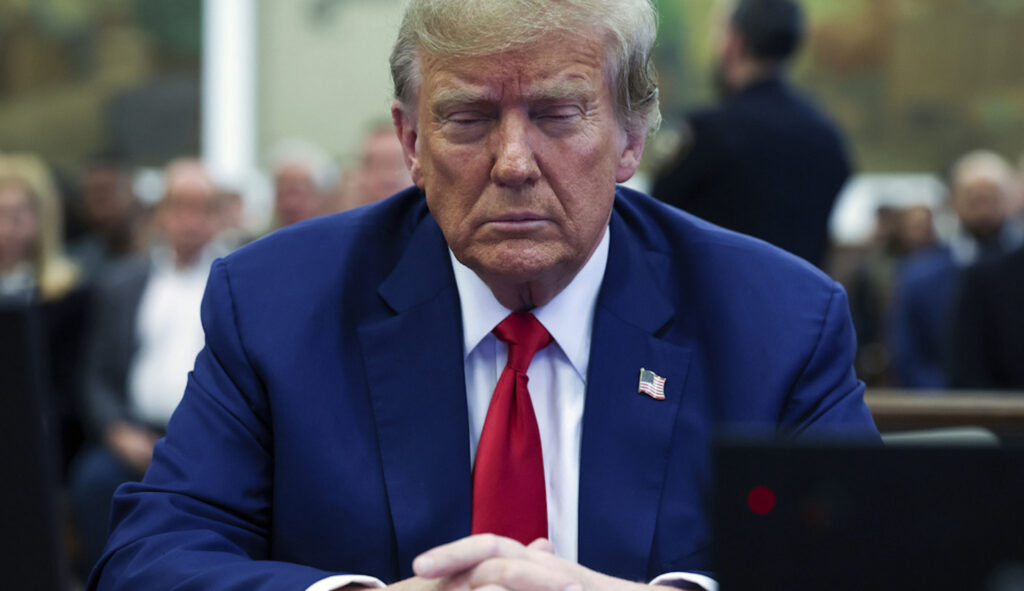Former President Donald Trump‘s appeal of a Colorado Supreme Court decision that removed him from the state’s primary ballot drew a crowd of overnight bystanders outside the steps of the highest court in Washington on Wednesday evening in hopes that they might have a chance to witness the historic 14th Amendment dispute.
Trump’s appeal stems from a lawsuit filed by a group of Colorado voters seeking to disqualify him from holding the office of president under Section 3 of the 14th Amendment. Outside the Supreme Court steps on Wednesday evening, the Washington Examiner spoke with a polarized group of people standing in line, from Trump supporters concerned they could be disenfranchised if the justices do not side with the Republican presidential front-runner to people who believe the Colorado high court ruled correctly that Trump “engaged” in insurrection.

“You know, I’m hoping that they return Trump to the ballot, specifically, just because I think everybody has that right to vote, and you’re just taking votes away from people that want to vote for Trump,” said Jesse Bills, a 29-year-old from North Carolina who will have waited more than 42 hours outside the high court by the time oral arguments begin at 10 a.m. Thursday morning.
Bills and his wife will likely be the first members of the public to enter the Supreme Court on Thursday, in which courtroom seating is on a first-come, first-served basis. Down the line from the couple, the crowd consisted of law students, congressional staffers, high schoolers, and those willing to brave a night of sub-40-degree temperatures to witness the historic case in the room where it will unfold.
“We’re just excited to see the justices’ reactions in person, the counsels’ reaction to their questions, you just get a better picture of it when you’re there versus audio,” said Shade Streeter, a 26-year-old man from Oregon.
Tim from Seattle, who requested to keep his full name concealed, told the Washington Examiner he hopes the 14th Amendment “will be applied to former President Trump” and find him ineligible to run for office. However, he said his “concern” is that politics could be at play for a ruling that keeps Trump eligible for the 2024 nomination.
“And I think he’s had due process, and he is an insurrectionist, so I think the amendment and the law applies clearly and directly to him,” Tim added.
Further down the line of more than 30 people, some of the eager court watchers conversed about the political implications of the case. One man who described himself as a non-Trump voter raised concerns about the potential for millions of voters to be disenfranchised if the former president weren’t allowed to appear on certain state primary ballots.
Samad Quraishi, a 16-year-old from Falls Church, Virginia, said he arrived at the high court around 4 p.m. on Wednesday. He said he believes the justices will approach the matter in a “very non-confronting way,” adding that “they’ll probably be very vague in their interpretation of what the insurrection clause should imply, they’ll probably refer it to Congress.”
Quraishi said he believes that “it shouldn’t necessarily be the decision of one state to sort of ban Trump entirely from the ballot when a lot of people do believe that Donald Trump should be the next president of the United States.”
The oral arguments for the Anderson v. Trump case stem from several Republican and nonaffiliated voters, including the namesake of the case, 91-year-old Norma Anderson, who believe Trump engaged in insurrection when he called on his supporters to march in protest of the 2020 outcome, which later devolved into hundreds of people storming the Capitol on Jan. 6, 2021.
Anderson had a 19-year career as a Colorado legislator and was considered a centrist Republican when she served from 1987 to 2005. She voted for third-party candidates in 2016 and 2020, according to the Washington Post, and briefly exited the Republican Party in 2018 due to Trump before rejoining in 2021.
Trump’s legal team, led by Jonathan Mitchell and David Warrington, is prepared to argue the former president should remain on the ballot for several reasons, including that Section 3 is not self-executing and that Congress must act first on the matter of eligibility, that it doesn’t apply to the presidency, that Trump was exercising his free speech rights on the day of the riot and called for peace, and that he did not engage in insurrection, among other points.
The Colorado Supreme Court’s 4-3 majority found that “congressional action is not required to give effect to the constitutional provision,” although dissenters on that same court could not come to the same conclusion. Meanwhile, the voters hope to benefit from two lower courts that found Trump did engage in insurrection despite the district court finding Section 3 didn’t apply to the presidency.
Some of the people in wait for the coveted courtroom seats murmured about whether the justices could be ideologically split once they return a final decision in the coming weeks.
The high-stakes case threatens to divide the country at a time when trust and approval of the high court has been in decline. A draft opinion signaling the imminent overturning of Roe v. Wade in the summer of 2022 prompted protests and even an unprecedented steel barrier outside the court for months.
CLICK HERE TO READ MORE FROM THE WASHINGTON EXAMINER
Thursday’s oral arguments will likely bring some new clarity to the public as to how the nine justices could decide the consequential case, which has implications for dozens of other similar lawsuits, largely backed by left-wing organizations, across the nation.

Trump has been at the center of other court cases, whether it be over his family’s business dealings in civil litigation or his fight against four criminal indictments, and has made it somewhat of a routine to appear at high-stakes court hearings involving his name.

